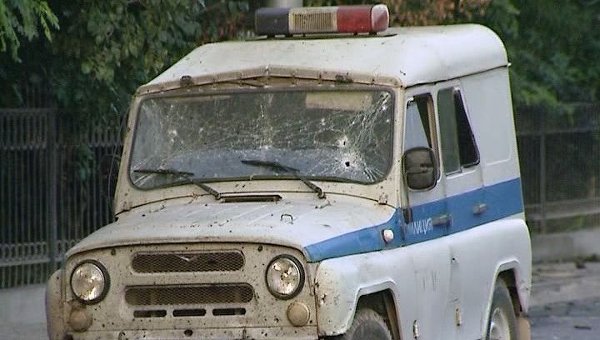
Separatism Spreads in the North Caucasus while Moscow Blames Outsiders
Publication: Eurasia Daily Monitor Volume: 7 Issue: 171
By:

Many observers have noticed that the situation in the North Caucasus is further deteriorating against the backdrop of two recent suicide bombings in the region, despite complacent reports of Russian officials who try to portray the desirable as reality. According to Russian authorities, the intensity of rebel activity increased by a third from 2008 to 2009 (www.kavkaz-uzel.ru/articles/163438/). Although the data are not yet available for 2010, there is no doubt that it will be marked as the most active period of the past several years. These numbers are the clearest evidence. Even in the Russian government’s own account available to the public, there have been four times as many actions qualified by Russian authorities as terrorist acts from January to August 2010 than in 2009 (https://finam.fm/news/71509/). That means 37 cases in total.
As usual, Russian propaganda is trying to explain the negative trend by pointing to increased foreign influence over the region. In the Russian understanding, it is impossible for the armed resistance movement in the North Caucasus to exist and survive autonomously. The Russians seem to present the organization of the North Caucasus rebels as some commercial branch that cannot subsist on its own without the overseas market. The mythical financial injections that pseudo-analysts have much talked about over the course of 11 years of war in the North Caucasus have never in fact been substantiated with evidence; neither has the flow of funds to the actual perpetrators from individuals alleged to have ordered terrorist attacks ever been clearly proven. In general, such allegations are meant for ordinary people who are prone to believe everything shown on Russian TV.
Year after year, the Russian propaganda machine has been trying to prove to the rest of the country that the whole world has risen to weaken Russia and to break it up. The West is alleged to be the usual suspect even without providing specifics, while the United States is portrayed as having its share in the scheme (https://forum-msk.org/material/fpolitic/4100001.html). Those allegations do not seem to be very ethical given the ongoing reset of relations between Washington and Moscow.
Georgia is yet another enemy in the eyes of Russia. Here, the imagination of the Russian military and politicians goes way beyond any realistic calculation. Without even bothering to look at a map of the Caucasus, they discuss how “mercenaries” carrying heavy bags stuffed with money and weapons penetrate the North Caucasus from Georgian territory. But the border there goes along the mountains and steep cliffs which rise 4,000 meters above sea level or even higher and are perennially covered with ice and snow. Even in the summer, there would be very few who would go on that kind of trek even without toting any bags.
The West is once again starting to believe that Chechnya is a nominal republic within the Russian state; otherwise, it would be difficult for them to interpret the numerous discrepancies between the Russian constitution and the actions committed by Moscow’s emissaries in Chechnya (www.la-croix.com/article/index.jsp?docId=2439318&rubId=4077). It must be stated that whoever comes to power in Chechnya cannot afford to make his own policies, according to common Russian tradition, as do the leaders of the other regions of the Russian Federation. In Chechnya, the intricacies of the very specific situation require that everything that happened over the past 20 years be taken into account. Anyone who tries to encroach on the historical memory of the Chechens will lack authority to speak on behalf of even the smallest portion of the Chechen population.
Even some experts from Azerbaijan on the Caucasus see the intensification of rebel activities in the North Caucasus as an attempt by the West to lessen Russian pressure on the South Caucasus by exacerbating the situation in the North (https://kavkasia.net/Russia/2010/1284592054.php). It is hard to agree with that assumption. Russia’s actions against Georgia prove the contrary; now Moscow has two new territories inside Georgia that act as a buffer between the North and South Caucasus. Georgian experts, on the other hand, believe that Georgia should not lose contact with the North Caucasus even if it decides to start negotiations with Russia. They argue that Georgia should keep the North Caucasus republics within a sphere of its potential influence by engaging with them in order to create a single cultural and political space in the Caucasus region (https://kavkasia.net/Georgia/2010/1284588768.php). However, Russia reacts badly to any contacts made by Tbilisi – even unofficial ones – with representatives of the North Caucasus peoples.
The situation in the North Caucasus might as well develop into a religious confrontation given the continued aggressive involvement of the Russian Orthodox Church in the conflict. The fact that Russian clerics confer their blessings on those who go to Chechnya and the North Caucasus in general (https://orthodox-newspaper.ru/events/at14627) can only further antagonize those in the region who sympathize with the armed resistance movement. In canonizing Yevgeny Rodionov, a Russian soldier who died in Chechnya, and declaring that he was killed exclusively for his Christian faith, the Russian Orthodox Church has only created more distrust, particularly given that there are no witnesses or sources of information, while the story is thought to have been fabricated.
The conflict in the North Caucasus has long had the features of an inter-ethnic standoff. Russian authorities, for example, felt compelled to stop drafting Chechen youths into the Russian army because there was a hostile attitude towards them both in the army units and among the local population. The wars have turned Chechnya and Ingushetia into virtually mono-ethnic societies. Dagestan now is undergoing the same process (www.newsland.ru/News/Detail/id/477059/), and Kabardino-Balkaria, with its ethnic Russian population appears to shrinking day by day, and could soon share the same fate (https://news.km.ru/russkix_vyzhivayut_iz_kabardino-).
Given all of this, it is not surprising that there is talk behind the scenes in the Russian federal government that the North Caucasus ought to be populated by ethnic Russians while North Caucasus residents should be dispersed across Russia – something that would make the region more tolerant (https://dkvartal.ru/news/99835923). But the history of the North Caucasus shows that there was no tolerance there at the time of the Russian Empire and the Soviet Union despite the fact that the Russian population was represented in the region in large numbers.
The policies of the current authorities in Chechnya are pushing the Chechens toward even greater separatism than before the Russian invasion. Until 1999, when the Russian army invaded Chechnya, separatism was naturally based on the Chechen Republic of Ichkeria’s policy of independence from Russian infringements. Modern-day separatism, on the other hand, appears to be an ideologically supported attack on Russian interests in any corner of the country where Chechen communities live. Increasingly, more and more Chechens think that they have a role in achieving the main goal of independence from Moscow.




